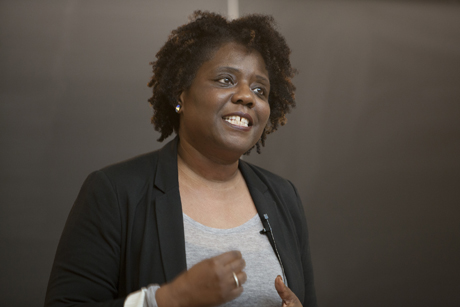At Reunion, Rooks calls for end to racial segregation
By Linda B. Glaser

Racial segregation remains a difficult problem in the United States despite popular views to the contrary, Noliwe Rooks, associate professor of Africana studies, told alumni at a June 7 Reunion presentation, “A Second Emancipation Proclamation?”
“It is becoming clear that policymakers across the political spectrum seem to believe that, aside from random acts of racial discrimination, we more or less live in a world where residential segregation is a reflection of individual choice,” said Rooks, adding that “the racial divide is either not considered to be very bad, or is now taken for granted.”
But this attitude is wrong, Rooks said, citing studies that showmetro areas with the highest levels of segregation have the largest health inequities; as a result, black and Latino residents of these areas will live far shorter lives than whites. “Between 2003 and 2010, the combined costs of health inequities and premature death based on racial segregation in the United States stood at $1.24 trillion,” Rooks said.
Rooks, whose current project examines the effects of racial segregation on education, also noted that a recent study found that up to two-thirds of the difference between test scores and grades for black and Latino students in the top 30 U.S. schools could be predicted based on the racial segregation of the students’ home neighborhoods.
“We know from 30 years of research that test scores and college-level success are far lower for students of color who attend racially segregated schools,” she said. “And of course we know that schools today remain segregated because neighborhoods remain segregated.”
At Cornell, Rooks serves on a committee examining the black male achievement gap. The group explores whether reaching out to students whose ZIP codes show they are from heavily segregated neighborhoods will make a difference. “We will be the first school in the Ivy League to try this,” she said.
Rooks advocated for the Second Emancipation Proclamation the Rev. Martin Luther King Jr. proposed to President John Kennedy in 1962. “Instead of outlawing slavery, it would outlaw racial segregation and bring the full force of all branches of the federal government to bear on making sure the country doesn’t just end segregation, but ensures integration,” explained Rooks.
But such a proclamation was too politically charged for Kennedy, who never responded to King’s proposal, she said.
Rooks said that although we as a nation no longer experience the excruciating dramas over segregation that characterized the 1960s, the impact of segregation in health, housing and education is still so prevalent today that it is past time for reform. Rooks urged the alumni audience to consider the benefits a Second Emancipation Proclamation would bring.
“Residential segregation does not have to last if we have the will to eradicate it. There is no better time to begin than on the anniversary of the Fair Housing Act, which is taking place on the 150th anniversary of the Emancipation Proclamation,” Rooks concluded.
Linda B. Glaser is staff writer for the College of Arts and Sciences.
Media Contact
Get Cornell news delivered right to your inbox.
Subscribe